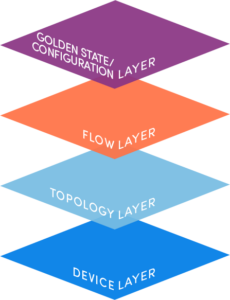Digital Twin of Your Network
“Through 2028, organizations using network digital twins to model their configuration and software/firmware updates will reduce their unplanned outages by 70%.” Gartner
Visualize network changes without disrupting operations with NetBrain's Digital Twin. A live model of your entire multi-vendor hybrid network, including Intent, traffic forwarding, topology, and device data underpins no-code automation and dynamic maps. Get a clear view of your intended changes and make informed decisions regarding configurations.

NetBrain’s Digital Twin is a robust virtual representation of your live network, including SDN, SD-WAN, and public cloud. It provides a comprehensive understanding of all relationships and dependencies within the network, helping experts maintain connectivity and uninterrupted workflows.
Our Next-Gen platform gives you access to four key layers, each with a unique set of functions:
Intent Layer
Golden State and Config Layer
The Golden State and Config layer captures your network’s golden configurations and states. It enforces compliance with industry standards and security protocols, ensuring your intent configurations align with best practices.
What sets NetBrain’s Digital Twin modeling apart from others is real-time data analysis with Reverse Engineering of devices and their network configurations and features required to successfully deliver business application needs. It builds automation by auto-discovering thousands of Network Intents for every reference device to create a network source of truth (NSoT).

Flow Layer

Flow Layer
Also known as the path layer, this area monitors traffic flows, looking for bottlenecks and network performance issues.
Unlike other digital twins, NetBrain calculates live, baseline, and historical forwarding paths across multi-cloud and hybrid environments, based on real-time routing/forwarding tables and control plane modeling for SDN (ACI, NSX) and SD-WAN.
Topology Layer
Topology Layer
NetBrain’s Digital Twin provides real-time topology and switching/routing detail across hybrid- and multi-cloud networks, including underlay (Layer 2/3), overlay (VPN/MPLS/VXLAN), and virtual cloud paths.
Simply put, the topology layer maps the network’s physical and logical structure. It helps users visualize connections, dependencies, and relationships within L2 and L3 more effectively.

Device Layer

Device Layer
The device layer serves as the foundation of the Digital Twin. It captures information on all operating details in real time. These include configurations, resource utilizations, and software versions of traditional, virtual, and cloud-based components from any manufacturer that exists in your hybrid network.
This layer’s main purpose is inventory and reporting. It gives users a comprehensive list of network assets and facilitates custom reporting.
Network Auto-Discovery
Network Auto-Discovery
Hybrid network management is laborious on its own. Simplify the tasks for your engineers further with NetBrain’s no-code automation platform. The network auto-discovery feature eliminates the need to manually build static network maps and continually refreshes every aspect of the connected multi-vendor network. Its auto-discovery engine supports all mainstream network technologies, using live data collection via API, CLI, and SNMP. It also:
- Supports the discovery of traditional, virtual, and cloud-based devices.
- Categorizes each device by site, device type, and application function.
- Crawls the entire network to build a structure using a single device seed.

Inventory Reporting

Inventory Reporting
Generate granular reports for every device connected to your network. Include any level of detail maintained in the platform for informed decision-making. Leverage a unified One-IP Table as your single source of truth, and use it as a reference for all IP, MAC, switch ports, and many other device-specific details in the Digital Twin.












